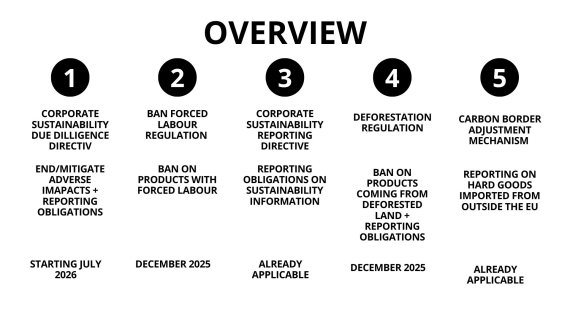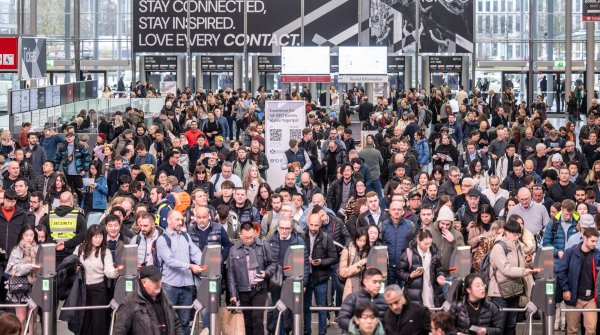The Corporate Sustainability Due Diligence Directive (CS3D) was adopted in summer 2024 following intensive political discussions. The aim is to encourage companies to take greater responsibility by identifying, minimizing and avoiding negative impacts on human rights and the environment.
The directive comes into force gradually:
- July 2026: Transposition of the directive into national law.
- July 2027: Applies to companies with more than 5,000 employees and an annual turnover of over 1.5 billion euros
- July 2028: Applies to companies with more than 3000 employees and a turnover of 900 million euros.
- July 2029: Applies to companies with at least 1000 employees and a turnover of 450 million euros.
Companies must identify risks and take measures to reduce harmful practices. A complaints mechanism and a plan to comply with EU climate targets are mandatory. A risk-based approach is taken: Companies cannot solve all problems immediately, that would be almost impossible. "You have to start where the highest risks exist," says Chiara Mingozzi.
Those who do not comply with the regulations must expect severe penalties. The penalties amount to at least 5 percent of global net turnover. In addition, companies can be held liable under civil law, with claims becoming time-barred up to five years after the offense. To facilitate implementation, the EU is providing guidelines and a central helpdesk.

The regulation banning forced labor is intended to ensure that no products from forced labor are offered on the EU market - neither imported goods nor products manufactured in the EU. Following agreement in April 2024, the regulation is expected to enter into force in December 2025. It will then be fully applicable at the end of 2027 or beginning of 2028.
One key point: the burden of proof does not lie with the company. Chiara explains:
Authorities can only withdraw products from circulation if they have already completed all the necessary investigations.
And that takes at least nine months. Companies therefore only have to react once there is concrete evidence against a product.
The procedure begins with an application that any person or organization can submit - with the relevant evidence. After a preliminary investigation, the companies concerned have 30 days to submit counter-evidence. If doubts remain, a formal investigation with possible on-site inspections will follow. The final decision can take up to nine months.
If the authorities find forced labor in the supply chain, the product will be withdrawn from the market. If individual parts are affected, only these can be removed - although this is often difficult in the case of textiles or shoes. If production has been converted to sustainable and fair conditions, the product can be approved again.
The Corporate Sustainability Reporting Directive (CSRD) aims to increase transparency about companies' impact on the environment, human rights and social standards. It came into force in January 2023, but has only applied to large companies of public interest since 2024. From 2025, other large companies that were not previously subject to the NFRD (Non-Financial Reporting Directive) will follow, and from 2026, listed SMEs will also be obliged to do so.
None of the companies have started reporting yet - the first reports for the 2024 financial year will not be published until 2025. Companies must submit their sustainability reports in the European Single Electronic Format (ESEF), no later than 12 months after the balance sheet date.
The CSRD also brings with it sector-specific reporting standards (ESRS). While general ESRS standards are already in force, specific requirements for sporting goods, textiles and footwear are to follow by 2026. An external audit requirement will be introduced for monitoring purposes.
Limited audit assurance will apply until October 2028, followed by stricter controls. Companies with parent companies outside the EU must either report themselves or oblige their EU subsidiaries to publish. The CSRD thus sets new standards for sustainable corporate governance.

The new EU regulation on deforestation aims to ensure that no products associated with illegal or harmful deforestation are placed on the European market. This regulation affects beef, cocoa, coffee, palm oil, rubber, soy and wood, as well as all products made from them.
The regulation was originally due to take effect at the end of 2024, but was postponed by a year. It will now apply from December 2025 for large companies and from December 2026 for smaller companies. The regulation applies to all market participants and traders who place affected products on the market or export them.
They must ensure that their supply chains are compliant.
The responsibility for each product remains with the companies themselves,
emphasizes Chiara. To do this, they must collect information, assess risks and take appropriate measures. Companies must also submit a due diligence declaration for each product, which contains details of the geographical origin.
The penalties for violations are severe: fines of at least 4 percent of annual turnover, and revenue and products can also be confiscated. The EU is thus sending a clear signal against deforestation - companies must act now in order to be compliant in time.
The Carbon Border Adjustment Mechanism (CBAM) is a central component of the EU's climate strategy. It mainly applies to hard goods and is intended to ensure that imported goods bear the same CO2 costs as products from the EU. The aim is to prevent the relocation of CO2-intensive production to countries with weaker environmental standards.
CBAM applies to cement, iron and steel, aluminium, fertilizers, electricity and hydrogen as well as some by-products. The regulation came into force in May 2023, with a transition phase from October 2023. Since then, companies have had to report on the emissions of their imported products on a quarterly basis. The first deadline expired in January 2024.
The final phase will begin in January 2026: importers will then not only have to report, but also purchase and surrender CO2 certificates. The costs are based on the EU Emissions Trading System (ETS). A company can use the annex to the regulation to check whether its product is affected. "Simply compare the CN code of the product with the regulation," is the recommendation.
There are exceptions for returned goods, samples and small consignments up to 150 euros. Those who submit incorrect or incomplete reports risk penalties of 10 to 50 euros per ton of CO2 not reported. Enforcement is carried out by the competent national authorities.
The pressure on companies is growing with regard to due diligence obligations, carbon offsetting, deforestation, forced labor and sustainability reporting. The first obligations will take effect this year. In order to be prepared in good time, companies should start integrating regulatory requirements into their strategies now. At ISPO 2025, you can find out what this can look like in concrete terms and what needs to be taken into account. In the Sustainability Solutions area, you can exchange ideas with experts, discover new trends and present innovations yourself. On the Green Stage, you will not only gain practical insights, but also concrete orientation and solutions on how to prepare yourself and your brand for the new sustainability rules. Be there and actively shape the future of the sports industry - from 30 NOV. - 02. DEZ. in Munich!
- Supply chain transparency: Companies must check their supply chains for sustainability and report on this regularly.
- Compliance with regulations: Forced labor and illegal deforestation must be avoided in the supply chain.
- Risk management: Risks must be identified at an early stage and minimized in a targeted manner, especially for the highest risk factors.
- Implement climate targets: Compliance with EU climate targets must be part of the corporate strategy, especially through CO2 reporting and certificates.
- Prepare for sanctions: Companies should ensure that they comply with all new regulations to avoid heavy penalties.
By adapting in good time, companies can avoid risks and safeguard their competitiveness.
- ISPO awards
- Mountain sports
- Bike
- Design
- Retail
- Fitness
- Health
- ISPO Job Market
- ISPO Munich
- ISPO Shanghai
- Running
- Brands
- Sustainability
- Olympia
- OutDoor
- Promotion
- Sports Business
- ISPO Textrends
- Triathlon
- Water sports
- Winter sports
- eSports
- SportsTech
- OutDoor by ISPO
- Heroes
- Transformation
- Sport Fashion
- Urban Culture
- Challenges of a CEO
- Trade fairs
- Sports
- Find the Balance
- Product reviews
- Newsletter Exclusive Area
- Magazine






